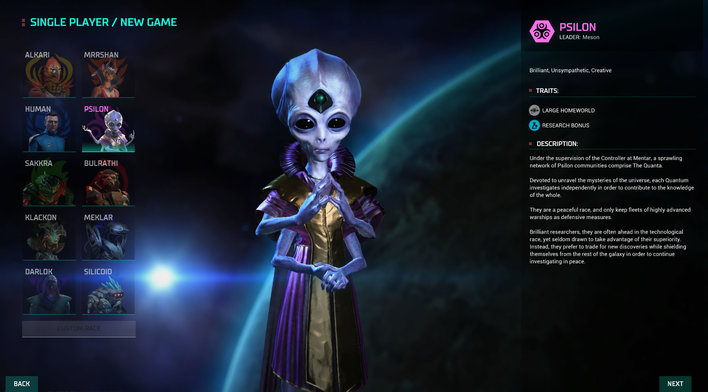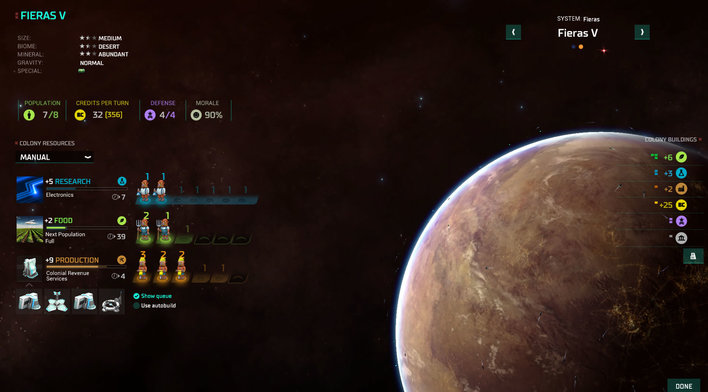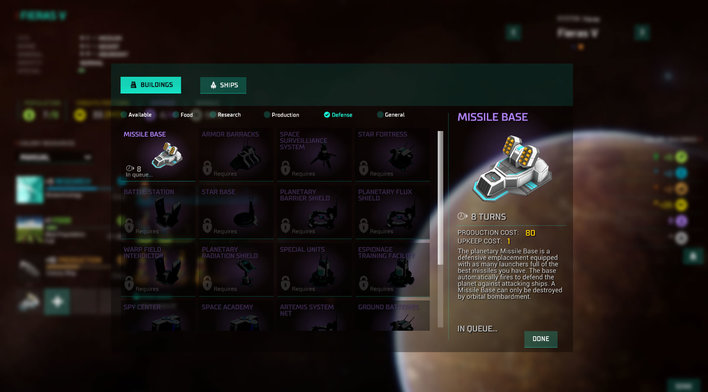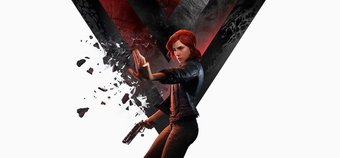Think of a game you love. Most of us have a special game - or even a handful of special games - that arguably defined us, and our childhood, that we grew up playing. Looking back on them now, though, it can sometimes a bit tricky to see why you were so into them (rose tinted glasses are powerful things), and somehow, the games you grew up playing don't always age as well as you'd hope.
But now imagine you actually went into the games industry, started up a company, and formed a multimillion dollar empire. You're flying high - and then the rights to your favourite game of all time came up for sale. That's what happened to World of Tanks studio Wargaming.net's CEO Victor Kislyi, as Randy King, Executive Producer on the Master of Orion reboot explains: "A long time ago, our CEO Victor played this game, and he loved it. So when it came up for sale by Atari, he had to have it. He wants to bring it back to life, so the world can experience the game he fell in love with - especially his kids"
A noble goal, then - but what is Master of Orion? Helpfully known in gaming parlance a 4X game - that's helpful in the same way a broken sat nav is helpful when you find yourself in deepest darkest Wales, because it tells you literally nothing about the game unless you already know what it stands for - it's an abbreviation that takes in the four "x"es - eXplore, eXpand, eXploit and eXterminate, which are roughly the four pillars of what you need to try and accomplish in Master of Orion. A turn based strategy game, you'll start out with just a handful of ships, and one planet under your control - and it's up to you to build up a base, produce more units, and explore the galaxy, expanding your empire by colonising planets as you go, or perhaps getting into the odd scuffle with a less than friendly alien race... or seven.
Before you get started with your intergalactic expansion, though, you'll have to make one of the most important decisions in the game - choosing which race you want to play as. Master of Orion comes with ten playable races to choose from, each of which has their own strengths, weaknesses and "perks". "Every race gives you some type of boost. Some races are better at warfare, some races love armour, [so you can choose a race to match your play style]" Our demo focussed on four of the game's races - the Alkari, a strange, bird like race who are proud, noble, but easily offended; the Darlok, a highly technological race, but one that prefers to steal rather than develop their own technology; the Mrrshan, a cat like race that are easy to please, but quick to turn; and the Psilon, a race that's very high on technology and research, and is essentially your stereotypical little grey alien.

The Psilon - see what we mean?
Jumping into a game as the Psilons, things start off with a bang, or at least a virtual one, with the creation of the galaxy you're going to explore - kind of like Master of Orion's big bang. Every universe you play through is entirely randomly generated, but with some pattern to its creation, with a "seed" starting things off. There are essentially 99,999 different universes to play through, and if you play through one you really like, all you have to do is make a note of the seed, and you'll be able to play it over again.
Played from a zoomed out, top down, semi-isometric view, when you first start out in Master of Orion, you'll begin with just one planet under your control, and infinite possibilities. With an entire galaxy at your fingertips, you'd expect this could be a bit intimidating, but luckily, each race comes with its own special advisor to help you learn the ropes. "What we've done is build a game that stays true to the original roots of the game - but also is fun to play for new players", Randy explains, as the advisor pops up on screen to tell us how to move our ships.
With plenty of blacked out planets around, ripe for exploring, your first task is to explore your nearby surroundings, making use of your starter fleet of ships. To begin with, we only have three ships making up our fleet - a frigate (which is essentially your battleship, and the spine of your military armada), a colony ship (used for colonising planets), and a scout, a nippy little craft that's designed to make exploring the galaxy as speedy as it can feasibly be - although at the cost of having any weapons. Leaving our frigate behind to protect our home base, we send our colony ship off to the nearest silhouetted planet to see what wonders it holds...
Exploring planets is key to Master of Orion, as each and every planet is different, and comes with different resources. If you want to keep your people in food and water, research new technology, build new ships, and expand your empire, you'll need plenty or resources - and different types of materials too - so colonising a wide array of planets is important. "We have 14 different planet types in the game, like terran, desert, radiated, toxic, gas. There's different sizes, different states in terms of the resources that are on them (good, poor, rich) - and, we have rare resources, which are randomly placed". So there's plenty for budding galaxy explorers to hunt out.
Once you think you've found a planet that would be a nice addition to your galactic empire, all you need to do is send your colony ship across to have a look around. This triggers a fancy looking animation as the colonisation process gets under way, giving you a glimpse of the planet's surface. Like the planet itself, this has been procedurally generated, to ensure that not only does what you see match the planet's description - but that you get a different cutscene every time.
Of course, with a great number of planets comes great responsibility (or something like that), as it's no use having a massive empire of millions of people if they all just sit around twiddling their thumbs. Your people need to be given something to do - and this is where the magic happens in Master of Orion.

If you don't want to spend all day clicking to discover planets, you can always set your scout to auto-explore, too!
The screen above is your planet micro-management screen, which lets you assign your population to various tasks. Each little character you see represents around a million people, and so you can assign your population to the tasks you think are most important. If you have a planet you want to be the centre of your empire's research, you can put its entire populace to work on research; if you want a planet to become a factory, churning out ships and buildings all day long, you can put your populace to work on production, shunning the food and research options. Of course, when you're just starting out, you'll probably want to put most of your people to work on food production, as that helps grow your populace, giving you more options. Managing your population, and putting them to work on the things that matter to you is the most important part of the game - and it's one that has a lot of depth. "Some people used to play this game with a spreadsheet next to them - but the hardcore players, they're going to expect this level of micromanagement, so it's there." For those who're just starting out, however, there's another way - autobuild. Ticking this option lets the game automatically handle your planet's production chain, building all the factories, farms, and other buildings you could need, without you having to lift a finger, leaving you free to worry about the rest of your empire instead.
Master of Orion also comes with a pretty substantial tech tree for you to research. With a branching path, each item you research will let you research another, and so on, unlocking buildings, ships, and other technology as you go, so again, you can research the items you'll need to suit your play style. Of course, research doesn't happen overnight, and like everything in the game, each research item will take a number of turns to complete, giving you another thing to plan for.
So, that's exploration and expanding - but what of exploiting and exterminating? The two last pillars of Master of Orion come into play after you've explored a little bit longer, when you've come into contact with other races. After your initial tense first meetings, you're able to request an audience with any of the races you've met, where you have to put your interplanetary diplomacy skills to the test, in your effort to keep everyone happy, as Randy showed us, requesting an audience with the Myrrshans. Through your audience, you can request various things, from open borders, allowing you access to their space, to simple trade packages - or, if you really don't like someone, you can just declare war on them and screw the whole thing (that's the exterminating dealt with, then).
Another interesting twist are the independent races - these are races that aren't affiliated with the other races in the game, but you'll happen across by chance when exploring a planet. These races will give you quests to complete, whether it's unlocking a certain technology, building a new building, or perhaps even taking out a nearby pirate base, adding another extra bit of structure to the game (and another thing to think about). Pirates are another thing that seem to exist only to make your time exploring the universe that little bit trickier, but the independent races probably won't have the firepower to take them out - so perhaps they'll ask you for help. Either way, with every quest you complete, the independent race will like you more - which is handy, because it brings us to the final part of Master of Orion - how you actually win.

Ship production is an essential part of defending your empire
Rather than being a fully open ended game, Master of Orion does have an end, and a goal for you to reach. In fact, it has five of them, with each requiring a markedly different approach. The first, Conquest, is simple enough - all you need to do is kill everyone else. The other four are a little bit more involved. Technology requires you to research everything on the tech tree, before any of the other races manage it - something that'll test your micromanaging skills to their limits. Economic requires you to first unlock interstellar stock exchange, and then take control of it - something that's difficult to do, as all the other races want to get there first. Then there's Diplomatic (which wasn't detailed), and Excellence, a goal which requires you to meet all the races, at which point a galactic council gets formed. Once this happens, all the races get together to vote on a supreme leader - and if you get voted in, you win the game. The twist is, even independent planets get a vote - so you need to be nice.
Complex though it may sound, a lot of work's gone into making sure Master of Orion will be as challenging for hardcore fans as it is accessible for newcomers. There's a lot of interesting little things at work behind the scenes here to make your life easier, from the various auto options, to something we're sure will come in hands - a timeline, which shows you a graph of what's been going on, and lets you restart from any point. The perfect remedy for that time you accidentally declared war on that race that was ticking you off, only to realise their army was 5x the size of yours, in the world of Master of Orion, there'll be no regrets.
And even though we've talked about the basics of the game, there's still so much more to cover that we haven't touched on. Some star systems will be controlled by monsters - giant space aliens that patrol around, destroying anyone who comes near, requiring an immense amount of firepower to fend them off. There's also ship to ship combat in the game, with two modes on offer - tactical (which lets you take control of the ships yourself), and simulated, although the tactical mode is so early in development, it wasn't actually on show. Then there are star bases, huge structures that can form blockades over nodes (think star gates), stopping other races getting near, and the planet morale system, whereby your residents go on strike if their not pleased. High taxes make people depressed, low taxes make them happy - looks like Jeremy Corbyn's onto a winner then (!)
With so, so much depth, Master of Orion could easily have been intimidating to someone who wasn't on board the first time around, but with so much effort having gone into the accessibility - and so much polish making the game as smooth, and easy to understand as possible, this is a strategy game we could see ourselves sinking hours into. And seeing as we usually even suck at Civilisation, that can only be a good thing.

















